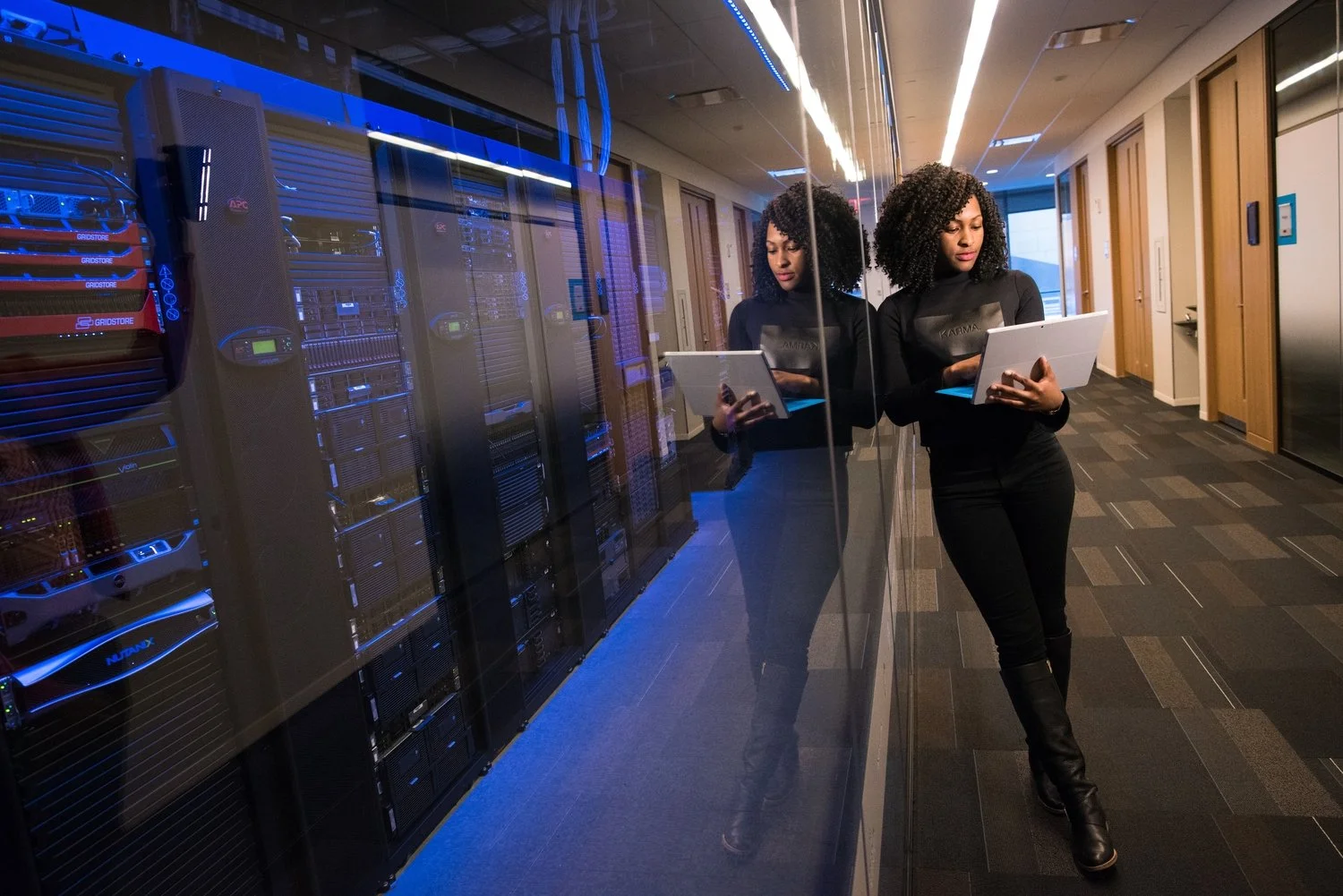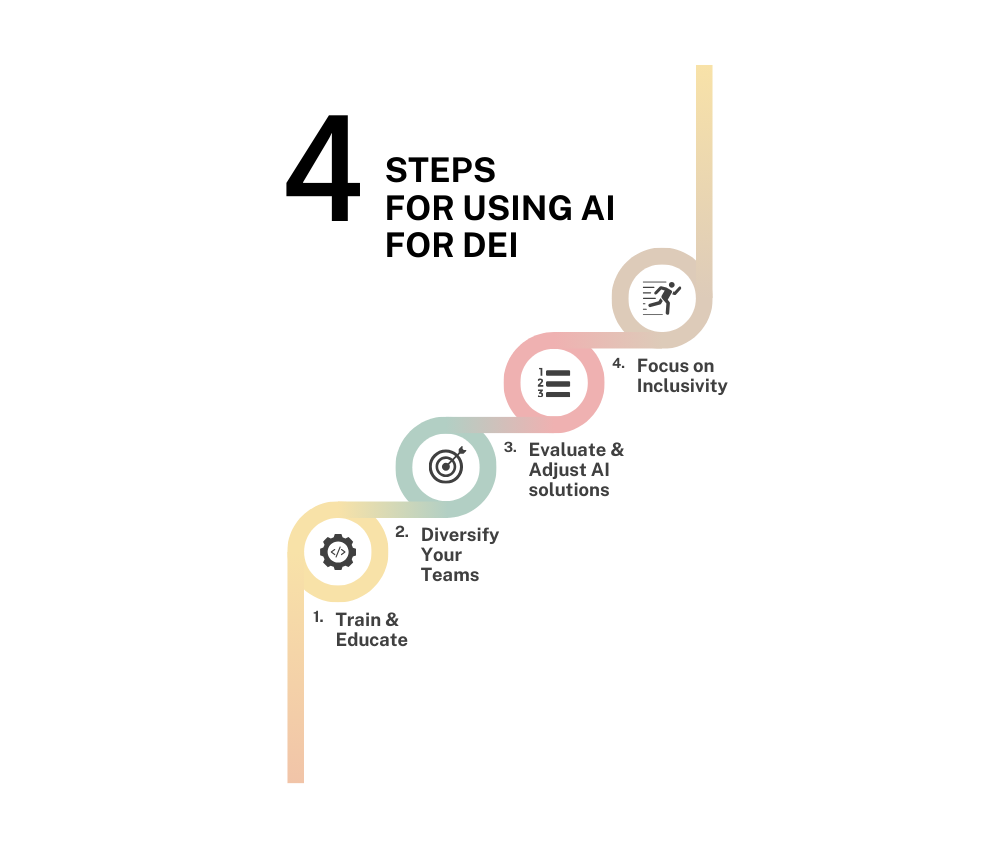3 Ways AI is Transforming the DEI Industry
Image of employee using laptop in a server room.
As DEI industry experts continue to adapt and evolve strategies to create more inclusive workplaces, they face similar economic adaptability challenges. This includes proving the value of DEI learning, maintaining the balance between action and words, and making the business case for inclusive leadership training.
With the booming popularity of Artificial Intelligence (AI), experts in DEI find themselves relying more on profound and innovative ways that AI can help to revolutionize the DEI landscape, ushering in an era of data-driven, bias-reduced, and people-first workplaces.
So, the questions posed are, “How is AI impacting DEI?” and “Where do we draw the line?”
How Artificial Intellgence (AI) is shifting diversity, equity, and inclusion (DEI)
Data-Driven Decision Making:
AI serves as an ally for DEI by showing the power of data. AI can collect, analyze, and interpret data to unearth critical insights. For instance, sentiment analysis tools sift through employee feedback, shedding light on their experiences and sentiments. Demographic insights allow organizations to identify trends related to gender, ethnicity, and age, providing a comprehensive view of their workforce. According to Gartner, 81% of leaders in the HR industry have used AI solutions to improve internal process efficiency as well. Armed with this data, organizations can enlist AI data support to make more informed decisions that are grounded in the reality of their employees.
Reducing Bias in Recruitment and HR Processes:
Bias, whether conscious or unconscious, has been a long-standing issue in recruitment, promotions, and evaluations. While human bias makes hiring processes unfair, AI, however, can help bring an objective lens to these processes. AI-powered tools, such as resume screening algorithms and interview assessments, are designed to eliminate bias by focusing solely on qualifications and skills. These tools aim to ensure that candidates are evaluated fairly and transparently.
By using AI to anonymize data during the initial phases of recruitment, obscuring information like names, gender, race, and addresses that could potentially introduce bias. This way, candidates are selected solely based on their qualifications, promoting diversity from the very beginning of the hiring process.
Enhancing Employee Training and Development
Traditional diversity training programs often suffer from a one-size-fits-all approach that fails to engage employees effectively. AI-driven personalized learning platforms are changing the DEI industry. These platforms adapt content to individual needs, interests, and learning styles, making DEI education more engaging and, ultimately, more effective.
AI systems have been known to help tailor diversity training for each employee, offering relevant content and resources based on their unique experiences and needs.
Pros and Cons of AI in the DEI Industry
Pros of AI in DEI
The advantages of incorporating AI into DEI efforts are multi-faceted. AI allows organizations to make better, data-informed decisions. Data-backed strategies lead to more effective DEI initiatives, reducing the guesswork and intuition that often pervades this field.
Additionally, AI helps mitigate unconscious bias in various processes. By using algorithms to assess candidates and employees objectively, organizations can improve hiring performance and significantly reduce the impact of subjective bias on decisions related to hiring, promotions, and performance evaluations.
Furthermore, since AI is scalable, making it suitable for organizations of all sizes. Whether you're a small startup or a multinational corporation, AI can support DEI endeavors. Lastly, AI enhances accessibility to DEI resources and training, ensuring that everyone within the organization can benefit.
Cons of AI in DEI
Despite its immense potential, AI in the DEI industry is not without its challenges. One critical concern is algorithmic bias. AI is a tool to assist, not a solution for DEI initiatives. AI systems are only as good as the data they are trained on, and if this data contains biases, the models may inadvertently perpetuate them. This requires careful human oversight and continuous monitoring to ensure fairness and accuracy.
Moreover, AI for DEI requires a human touch and there is a concern about the loss of this touch in DEI initiatives when heavily reliant on AI. While AI can automate many aspects, it's essential to strike the right balance and maintain human involvement, especially in sensitive matters like conflict resolution or accommodation requests.
Data privacy is another hot-button issue. Collecting and using sensitive employee data to drive AI-powered DEI initiatives must be done with utmost care, respecting all applicable regulations and ensuring the security of this data.
Implementing AI solutions in the DEI industry can be costly and complex. Organizations must carefully consider their budget and resources before diving into AI-driven DEI initiatives.
4 Steps for Moving Forward using AI for DEI
Invest in Training and Education
To harness the potential of AI in the DEI field, leaders must prioritize education before and after adoption. This includes acquiring the knowledge needed to understand AI and its implications for DEI, as well as ensuring that HR professionals and teams are well-versed in these concepts. Many reputable organizations and online courses offer AI training programs, making it accessible for everyone.
Diversify AI Development Teams
Leaders should advocate for diversity within AI development teams. A team comprising individuals with varied backgrounds and perspectives can better identify and mitigate bias within AI models. Diverse teams can also innovate more effectively, leading to AI solutions that are both fair and efficient in addressing challenges.
Regularly Evaluate and Adjust AI Solutions
AI solutions are not static; they need ongoing evaluation and adjustment. Leaders should establish mechanisms for continuous assessment to ensure that AI tools remain aligned with DEI goals. Flexibility and adaptability are paramount in the field of AI-driven DEI initiatives.
Create a Culture of Inclusivity
As leaders, it's essential to create a culture of inclusivity throughout the organization. DEI efforts should extend beyond AI implementation and permeate every aspect of the workplace. Involving employees in DEI initiatives, seeking their feedback, and actively addressing their concerns can create a more inclusive environment where every voice is valued.
Adapt Your Current DEI Process with The Rise Journey
As DEI evolves daily, AI emerges as a formidable tool when used responsibly. Its ability to drive data-informed decisions, reduce bias, and enhance training holds great promise for creating more inclusive and equitable workplaces. However, as leaders, we must tread carefully, acknowledging the potential pitfalls and ethical considerations. Paired with the right knowledge, a human touch, and people-first focus, the DEI industry will successfully adapt to the new norm.
Ready to take your DEI efforts to the next level? Contact our team to learn more about our HR and organizational assessments, DEI assessments, and DEIBA services. Start your journey toward a more inclusive and equitable future.
Key Takeaways
AI is revolutionizing the DEI industry by enabling data-driven decision-making, reducing bias in recruitment and HR processes, and enhancing employee training and development.
AI empowers organizations to make informed decisions by analyzing employee data, uncovering insights, and promoting data-backed DEI strategies.
AI helps to eliminate bias in hiring and evaluations by focusing solely on qualifications and skills, thus promoting fairness and transparency in recruitment.
Personalized learning platforms adapt DEI training to individual needs, making it more engaging and effective for employees.
While AI offers benefits such as data-driven decision-making and bias reduction, it also poses challenges, including algorithmic bias, loss of the human touch, data privacy concerns, and cost and complexity considerations.
Leaders should invest in AI education, diversify AI development teams, regularly evaluate and adjust AI solutions, and foster a culture of inclusivity to maximize the benefits of AI in DEI.





